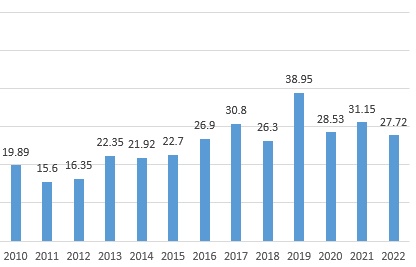Transitional support the key to protect the labour force
9:00-10:30, 16/6/2023 Live- Talk show: New opportunities in the job transition
According to statistics from the Ministry of Labour, Invalids and Social Affairs (MoLISA), nearly 280,000 workers lost their jobs in just five months, accounting for about 55 per cent of the total number of employees affected. Nearly 195,000 workers have had their working hours reduced, around 17,000 labourers had to take unpaid leave, and more than 8,300 people have their contracts suspended.
“Enterprises suffered from a lack of orders due to difficulties in major export markets, high inflation, and tight monetary policy, which reduced purchasing power – especially in demand for fashion items and personal electronic devices. Many businesses are facing a large inventory of goods that cannot be exported, while there are few new orders,” Dung shared.
To date, more than 8,600 enterprises in Vietnam have been forced to reduce their workforce, of which 27.4 per cent are foreign-invested enterprises, 72.2 per cent are non-state enterprises, and 0.4 per cent are state-owned enterprises. They are mainly operating in textiles, footwear, wood processing, manufacturing, and electronic component assembly.
 |
| 9:00-10:30, 16/6/2023 - Talk show: New opportunities in the job transition |
The report from the MoLISA also indicates that the localities with the largest number of affected workers are the places with the largest concentration of industrial parks and economic zones in the country, including Binh Duong, Dong Nai, Ho Chi Minh City, Bac Giang, Bac Ninh, Hai Duong, and Hanoi.
According to Navigos Group, the recruitment demand of many occupational groups in the first half of this year decreased by 18-43 per cent compared to the pre-pandemic period, focusing mainly on the industries with the largest recruitment demand such as textiles and footwear, construction and real estate, IT, transport and logistics, administration, and marketing and sales.
The wave of lay-offs is expected to continue until the end of the year due to difficulties stemming from the economy, according to the Private Economic Development Research Board in a new survey. About 5,200 out of nearly 9,600 businesses surveyed said they will still cut more than 5 per cent of their employees before the end of 2023.
| Key tasks and measures to meet the requirements of the Fourth Industrial Revolution The Directorate of Vocational Education and Training (DVET) is being assigned a number of key tasks in advising on policies, strategies, and solutions to improve vocational skills for employees, thereby contributing to increasing labour productivity, national competitiveness, and raising people’s income, bringing the country out of the middle-income trap. The DVET is implementing a series of measures, including the country’s vocational training development strategy in the 2021-2030 period, with a vision to 2045; and the programme “Training and retraining to improve human resource skills to meet the requirements of the Fourth Industrial Revolution” according to Decision No.1446/QD-TTg dated August 2021. - First, legal regulations as well as policies to support vocational training for employees need to be continuously revised, amended, supplemented, and improved to meet the development needs of labour market. It is necessary to diversify training types, and focus on retraining and regular training for the workforce. In addition, the DVET also needs to reorganise the network of vocational education institutions, build regional linkage models in training and human resource supply, build national centres for high-quality vocational training and practice according to key economic regions, and promote digital transformation in training. - Second, international cooperation and labour market links at home and abroad need to be strengthened. It is necessary to inform and propagate to raise the awareness of employees, employers, and other subjects participating in the labour market to ensure stability and development. - Third, the creation of decent jobs and effective use of the workforce should be promoted, focusing on implementing solutions to channelise and improve the quality of human resources to meet the requirements of the labour market; increasing investment and development of economic sectors to create more sustainable jobs; synchronously investing in facilities, equipment, and quality assurance conditions for vocational education institutions and higher education institutions; and investing in training to improve skills for employees. |
Meanwhile, the International Labour Organisation’s World Employment and Social Outlook 2023 Trends Report also confirmed that global employment is forecast to increase by only 1 per cent, down from the 2.3 per cent growth rate of last year. The gloomy employment has posed a problem for management units, led by the MoLISA, to provide timely support policies for workers to soon settle down and help them in transition to more suitable jobs.
The draft revised Law on Employment being developed by the MoLISA has proposed to supplement training policies, improve vocational skills for workers to help them maintain jobs and support unemployed workers to participate in training courses to improve vocational skills.
Pham Vu Quoc Binh, deputy director of the Directorate of Vocational Education and Training, said that it is also promoting international cooperation through signing with many corporations, associations, large enterprises, and agencies of Japan, Taiwan, and South Korea to organise training and supply trained workers.
“Vocational training programmes are designed to approach the needs of the market to help learners equip themselves with necessary business skills. The quality of human resources will be improved, able to quickly adapt to the changes of the labour market, and have the opportunity to find better quality jobs, especially in the context that Vietnam is becoming an attractive destination for many foreign businesses,” Binh said.
Wishing to contribute more initiatives and solutions to the challenges of the labour market, helping employees access opportunities to change jobs more effectively, Vietnam Investment Review will hold a talk show themed “New Opportunities in the Job Transition.”
The talk show will take place from 9am on June 16 with the participation of representatives of regulatory agencies, advisory firms, and businesses, and will be livestreamed on platforms under the VIR system.
 | Adhering to the law in termination of labour contracts in Vietnam A guideline issued by the Supreme People’s Procuracy in November covered a number of fundamental contents in the supervision of settlement of individual labour disputes including specific guidelines on settlement of disputes of unilateral termination of a labour contract. In addition, an August verdict issued by the Appeal Court of Binh Duong province also covered some noteworthy views of the court in settlement of a lawsuit on unilateral termination of a labour contract. The last piece of this article will address proposed to-do actions. |
 | Labour market’s growth an opportunity for improving social welfare The capital city of Hanoi’s labour market has seen positive developments after the Tet (Lunar New Year) holiday, presenting a ‘golden opportunity’ for the sustainable development and expansion of the social insurance system. |
 | Changes in labour market since Vietnam's Law on Foreign Investment The official passage of the Law on Foreign Investment in Vietnam in 1987 is considered a historic turning point that contributed to attracting an increasing number of foreign-led enterprises to the nation. Nguyen Xuan Son, operations manager for Staffing and Outsourcing Services at ManpowerGroup Vietnam, discusses the law’s effect on the labour market and employees in Vietnam, as well as the expected trends for the next few years. |
 | Number of Vietnamese labourers in RoK grows The number of Vietnamese workers registered to work in the Republic of Korea (RoK) has reached more than 23,400, nearly double the agreed recruitment target between Vietnam and the RoK, the Centre for Overseas Labour under the Ministry of Labour, Invalids and Social Affairs announced. |
 | IT among most needed jobs in Vietnam: Experts Occupations relating to information technology, high-tech and supporting industries are employment groups with high recruitment demand, experts have said. |
 | The impressive changes in Vietnamese labour market The official passage of the Law on Foreign Investment in Vietnam in 1987 is considered a historic turning point that contributes to attracting an increasing number of foreign-led enterprises into Vietnam over the years. Multinational corporations opening new branches as well as newly established foreign-backed enterprises in many fields create great demand for domestic labour, generating jobs and improving livelihoods and quality of life for Vietnamese people. |
 | Investment and new labour tie-ups lead UAE negotiations An upcoming economic cooperation deal between Vietnam and the United Arab Emirates will help both economies to beef up investment flows and trade ties. |
What the stars mean:
★ Poor ★ ★ Promising ★★★ Good ★★★★ Very good ★★★★★ Exceptional
Related Contents
Latest News
More News
- Congratulations from VFF Central Committee's int’l partners to 14th National Party Congress (January 25, 2026 | 09:46)
- List of newly-elected members of 14th Political Bureau announced (January 23, 2026 | 16:27)
- 14th Party Central Committee unanimously elects To Lam as General Secretary (January 23, 2026 | 16:22)
- List of members of 14th Party Central Committee announced (January 23, 2026 | 09:12)
- Highlights of fourth working day of 14th National Party Congress (January 23, 2026 | 09:06)
- Press provides timely, accurate coverage of 14th National Party Congress (January 22, 2026 | 09:49)
- Press release on second working day of 14th National Party Congress (January 22, 2026 | 09:19)
- Minister sets out key directions to promote intrinsic strength of Vietnamese culture (January 22, 2026 | 09:16)
- 14th National Party Congress: Renewed momentum for OVs to contribute to homeland (January 21, 2026 | 09:49)
- Party Congress building momentum for a new era of national growth (January 20, 2026 | 15:00)

 Tag:
Tag:



















 Mobile Version
Mobile Version